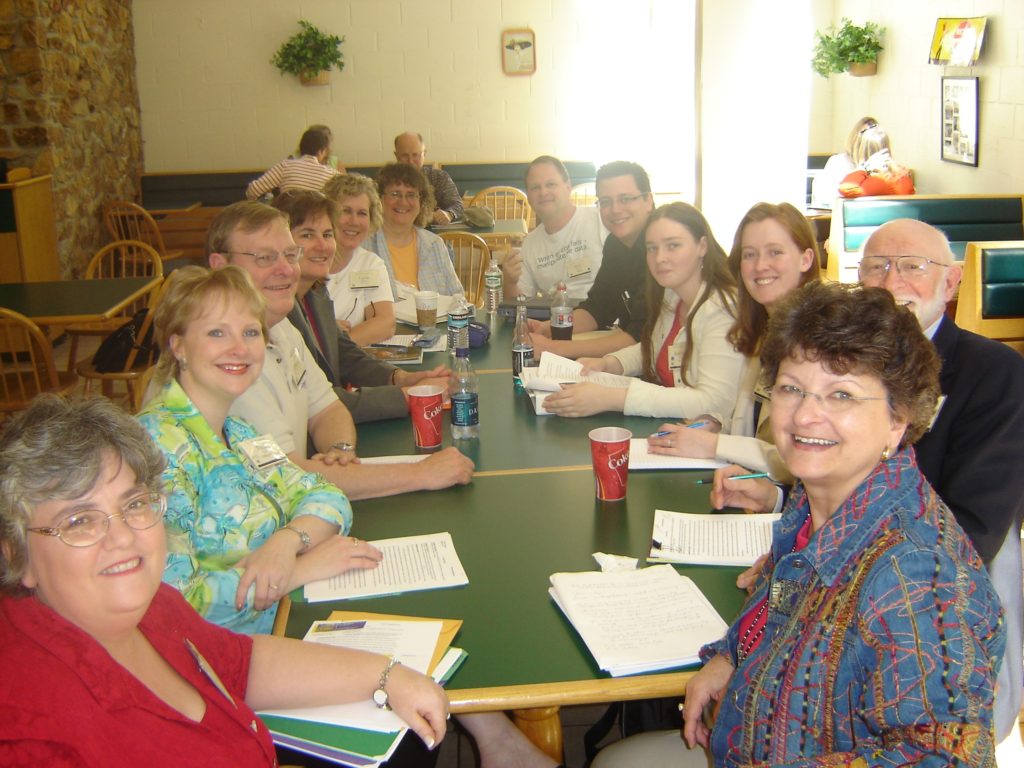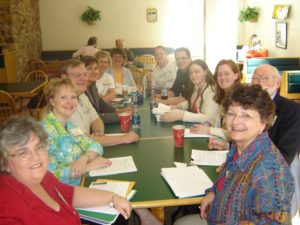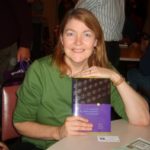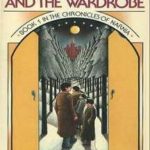The Inklings, Part 2 – Who Are They
So are we an incarnation of The Inklings?
As wonderful as my writing group is and as grateful as I am for the friendship and help these writers give me, the truth is we aren’t anything like The Inklings, except for the ways in which we are. 😉
First, The Inklings began as an informal writing group. They developed in part from an Oxford club founded by Edward Tangyre Lean, an undergraduate who established the group primarily for critique of unpublished works. To gain credibility, perhaps, he decided to include some faculty and invited both C. S. Lewis and J. R. R. Tolkien to join. His club, which he named the Inklings, lasted for several terms, but when he graduated in 1933, the group folded.
 The name Inklings, now available, was transferred to a group meeting in Lewis’s rooms at Magdalen College. In fact various members of the now famous group had been meeting informally years prior to the adoption of the name.
The name Inklings, now available, was transferred to a group meeting in Lewis’s rooms at Magdalen College. In fact various members of the now famous group had been meeting informally years prior to the adoption of the name.
There appear to be several critical dates in the establishment of The Inklings. In December 1929 Tolkien first gave Lewis something from his own creation to critique. Nearly two years later, in September 1931 Lewis embraced faith in Christ — an important part of the foundation of The Inklings, because only two things were required for consideration of members: that they write and that they were Christians. The third key date was 1932 when C. S. Lewis’s brother Warren retired from military service and moved to Oxford. From that point he joined the meetings.
Typically the critique sessions were held every Thursday night in Lewis’s rooms. Those attending would arrive some time after dinner, and the evening was given to reading a work and giving praise for it and/or suggestions to make it better.
The group soon began to grow.
Scholars now identify nineteen men as part of The Inklings, though most Thursday meetings only saw six or seven members gather. The four who attended most faithfully were the two Lewis brothers, Tolkien, and Robert E. Havard. Others on the list are Owen Barfield, J. A. W. Bennett, David Cecil, Nevill Coghill, James Dundas-Grant, H. V. D. Dyson, Adam Fox, Colin Hardie, Gervase Mathew, R. B. McCallum, C. E. Stevens, Christopher Tolkien (J. R. R.’s son), John Wain, Charles Williams, and C. L. Wrenn.
Was mystery writer Dorothy Sayers a part of The Inklings? Apparently not, though she was friends with a number of The Inklings — C. S. Lewis and Charles Williams in particular. She was also a member of a separate group, the Socratic Club which included a number of The Inklings but which served a very different purpose: to provide a forum for Christians and atheists to discuss their divergent beliefs.
The Thursday critique sessions were not the only meetings of The Inklings. An even more informal gathering took place every Tuesday morning at the pub The Eagle and Child, also referred to as the Bird and Baby. Unlike the evening meetings, these get-togethers were open to the public and less serious. They were given to talk among friends, discussion of theology, and of course conversation about literature.
The key to The Inklings was the double linchpins of their love of words and their love of Christ. But one other thing can’t be ignored. These men of letters lived in Oxford, a place that fostered academic pursuits. In other words, it was no accident that so many men interested in similar subjects were in the same location at the same time. Of course, in light of God’s sovereignty, we know it was no accident at all.
Because of the like-mindedness of these various men, it is no surprise to learn that The Inklings interacted with one another apart from their two weekly meetings.
They saw one another in many other venues: for lunch, dinner, or beer; on walking tours through the English countryside; for feasts and special events, such as occasional ham suppers and the special weekend celebration to toast the end of the war [World War II]. Although the Thursday group was fairly stable and predictable, a network of friendships preceded these Thursday meetings and continued long after the regular meetings ended. (The Company They Keep: C. S. Lewis and J. R. R. Tolkien as Writers in Community by Diana Pavlac Glyer, p. 18).
In other words, The Inklings became a community more than a group or even a club. While the regular sessions lasted some seventeen years, a number of the friendships developed within that setting were apparently life long.
Can any group today ever replicate what The Inklings became? What are your thoughts? What advantages do you think they had? What advantages do we have today that they missed out on?












Becky,
Can’t say that I feel they missed out on anything like an advantage that we might have today; but neither did we miss out on advantages they had. It wasn’t all peaches and cream for these men. (Hmm, I guess one HUGE advantage would be the inclusion of women in such groups now.) We can romanticize these things, don’t you think? It’s not possible to replicate what they had, but we can enjoy our God-given goodies of today: writerly/Christian relationships that are excellent, just different perhaps.
This gave us lots of good materials on this amazing writer’s/friends’ group. Thank you!
Maria
Maria, women in the group would definitely be something I’d want! 😀 In fact, because it was all men, Lewis and co. have been accused of being misogynists. I think that’s silly. The fact is, the times were different. As Glyer pointed out in her book, same-sex clubs in colleges were the norm, not the exception. Often times the function of the club was exclusive to a single sex, as society functioned in those days — a boxing club, for instance, or rugby, and so on. So most clubs were not gender mixed.
What a sad lot that would have been — to love books and be a Christian and know there was this great group of intellectuals discussing these things, and not be included.
So yes, today we women have that advantage (though we’ve lost a lot, too). But I also think the Oxford community was an advantage and a disadvantage. An advantage in that their closeness allowed for so much more interaction. A disadvantage because it made for a much more closed group (how’s that for two sides of the same coin? 😆 ).
I am amazed still that the world we live in today allows for something like these blog discussions with people who might live thousands of miles apart. Yet our interests in words and Christ, speculative literature and faith, can bring us together in discussions that are challenging, that can engender growth and spark new ideas.
Thanks for being a part of that, Maria!
Becky
Becky, thank you for your well-considered answers, and encouragement.
I think it would be great to be a part of those discussions way back then, but in a very real sense we still can be, through their books. Reading is mind to mind, as others have said, intimate and friendly, and also one isn’t as easily distracted by nonessentials.
Yes, for us we have much of the same thing in the discussions here and elsewhere online (which are great and diverse), and in our various other support groups.
I attend (ahem!) a writers’ group at the local (yikes!) Senior Center, and it is wonderful. We can even boast of our 19 year old mascot, Bianca, who writes poetry and loves us whom she calls ‘elders’. You’ve got to love it and laugh a little.
In the meantime also, we can read fascinating books like The Company They Keep (I must read this!) that let us learn more about these ‘true friends we’ve never met (yet)’ and eavesdrop on them too.
Reading is mind to mind, Maria, but we don’t get to ask questions or to tell them to slow down and explain again what they mean. Some of Lewis’s theology I’ve had to go over and over before I begin to get it. And Tolkien’s “On Fairy-Stories” essay was that way for me, too. Even then I wasn’t sure I was getting all of what he said.
Then I’d like to find out what they think about stuff today. I think it’s such a unique group. I suppose the English Romantic period writers may have had something similar, without the Christianity. And Thoreau and Emerson here in the US. I think it’s the Christianity that makes the appeal so strong for me.
Becky
Yes, you’re right about these things, Becky. A one-way conversation is limited. Also, yes the Inklings’ great, ultimate appeal is their Christian faith.
I’ve admittedly not had much success with formal “writing/critique groups,” though I can name writers who had success there. Writing groups are, to quote a writer friend of mine, a bit like searching out Bible studies: Either you’re going to click, or you’re not. I think likely a key component, like-mindedness aside, is that this wasn’t just a random group who saw each other for a couple hours once a week or month and didn’t have much else to do with each other after that.
For me, personally, what’s been a key factor has been:
1. People who are familiar with either my writing specifically or with the general style/genre I’m after
2. People who are willing to be honest and allow the road to run both ways (if they’re writers)
The little band of brothers of writer friends I’ve got has proven crucial, but I’m not sure you could really even call us an organized group. But I think the biggest factor, formal group or ragtag bunch, is the mutual support and camaraderie. Writing can be psychological and spiritual warfare at times, and, well, sometimes just that one person who keeps pushing can mean all the difference in the world.
Kaci, I agree. When I learned how much interaction these Inklings had with each other, I thought that was likely a unique, unrepeatable occurrence. It’s just so unlikely that you’d find that many people with the same kinds of interests, with the time to spend together in conversation that frequently, willing to involve themselves in each other’s lives to that degree. “Community” was the best word I could come up with, but Church might be a good one, too. But these guys had books in common, besides having The Book in common. I could easily become envious until I remember that part that Maria pointed out about no women! 😉
I agree with your requirements for a successful group. I was in one conference group once and one of the people said, essentially, I don’t do fantasy, and pretty much had little to say about my work. I hadn’t run into that before. In an online group I’d had mostly non-fantasy critters and they all gave good help as best they could. Now I value how they helped me more than ever.
And truthful! Yes, even though it may not always be comfortable to hear, it’s the only way to improve.
Mutual support and camaraderie are vital. Great that you’ve got those in a group no matter how unorganized it may be. 🙂
Our little group started out as a social venture, just a way to connect with other writers between conferences. I don’t think any of us envisioned a regular group with critiques and all in those early days. But groups have a way of evolving to the level of need, I think.
Thanks for adding to the discussion, Kaci, with your group experience.
Becky
The only critique groups I have had access to are class workshops for poetry and forum comments for fiction. I’m half-dreading my fiction workshops in class, since it’s not my prefered genre, but the comments I have recieved on my work so far are encouraging.
That’s great, Galadriel, that you’re getting encouragement. It is so important. It’s a kind of love, and we can’t do without this.
Hope it goes very well with your fiction workshop, even if fiction isn’t your preferred genre. This kind of thing can stretch us, and then we will bring a freshness back to the work we prefer.
No, fiction is my favorite genre, but for class we have to write mainstream fiction.
I agree with Maria, Galadriel. It’s great that you’re getting encouraging comments. I’m surprised that fiction is not your preferred genre. Poetry is?
Heh! There was an Inklings II in the Mythopoeic Society during the late sixties, early seventies. (Only our youth excused such hubris.)
😉 You’re not the only ones, Sherwood. Many of us wanted some sort of Inklings tie in, perhaps not so much because we see ourselves as their equals in ability or thought but because it’s so inspiring! Look how many writers list one or more of the Inklings as an inspiration.
Becky
Sherwood, perhaps it wasn’t hubris, but just looked like that in retrospect. Perhaps it was admiration and love for these fine authors.